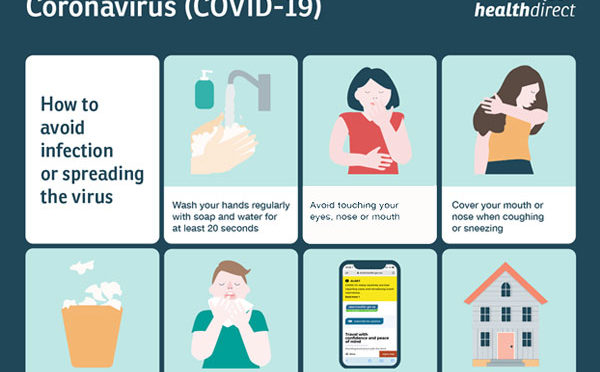COVID-19: A Primer
Posted on : April 20, 2020Author : AGA Admin

Over 1,61,402* deaths worldwide and over 23,47,875 infected, the novel coronavirus outbreak has been declared a pandemic by the World Health Organization. The disease had initially affected most of the West due to its connectivity with China, but has gradually affected countries like India, Pakistan, Egypt and other less connected countries, as well. People are in a constant fear and panic, due to which masks have become scarce and prices of alcohol-based sanitizers have increased. Till now, over 16,000 infected cases have been confirmed in India, and the nation is under complete lockdown since the last week of March. Governments have taken action rapidly, but when the outbreak will cease continues to be a mystery.
What is the new coronavirus and how did it spread?
Coronaviruses are a large family of viruses which may cause illness in animals and humans. In humans, several coronaviruses are known to have caused respiratory infections like common cold to more severe diseases like Middle East Respiratory Syndrome (MERS) and Severe Acute Respiratory Syndrome (SARS). The most recently discovered coronavirus causes COVID-19(Coronavirus Disease 2019) which is similar to SARS but less deadly. It spreads through being in proximity to an infected person by inhaling droplets when they sneeze or cough, or by touching surfaces where these droplets land and then touching our nose, eyes, mouth and face. The pathogen is suspected to spread from Wuhan’s Huanan Seafood Wholesale Market in the port city of 11 million people in the central Hubei province of China. China’s wild animal markets are not an unknown source of widespread diseases. The SARs- Cov 2 spread from bats to civet cats which were consumed by the people of China which also spread from an identical wet market. Though less deadly than SARs with a fatality rate of 1-2% but it’s very contagious and it’s spread is difficult to curb. Like common cold viruses, our body doesn’t possess herd immunity to the disease. The virus’ surface is covered with spike proteins which help it to penetrate into our lungs. The possible symptoms declared by WHO are fever, runny nose, dry cough, sore throat and difficulty in breathing.
China and the pandemic
Dr. Li Wenliang, an ophthalmologist at Wuhan Central Hospital, was silenced when he first shared the information of an outbreak due to a virus similar to SARS with his former classmates over WeChat. Soon, it came into the attention of higher authorities, and he was caught by local police authorities for “disrupting social order”. He then had to state that he would never repeat such “illegal behaviour” and therefore be allowed to go to work again. The doctor who is one of the first whistle-blowers died out of the same coronavirus disease. On December 30th , China reported to WHO about several cases of unusual pneumonia in Wuhan but nothing was told about coronavirus or a SARS like outbreak. On the same day Li shared the information on a personal chatting space. In late January China’s highest court admonished Wuhan police for the detentions. The court said “Rumors end when there is openness” and mourned for the delay in alarming the citizens about the disease. Chinese president Xi Jinping, is bent on showing the Chinese’s government’s ability to fight the epidemic which they named as “people’s war” and how they have triumphed over it, by suppressing and censoring news, harassing citizen journalists and shutting down news sites. The repressive government wants to use the media for political purposes and curb the freedom and lives of Chinese citizens. The US-China trade war may be a reason for such an activity, but violation of human rights is not a feature of a democracy.
The effect on world economy and climate change
Around the world restaurants, shops, schools, colleges, airlines and factories are shut down, economists are of the opinion that a global recession is no longer a looming threat, but it’s very near. The credit rating agency, which measures the credit worthiness of governments and companies around the world, said that the virus and the epidemic has gravely affected economic activity especially in China. The Chinese government’s censor to stop the first whistle-blower was to maintain economic and social stability. The second-largest economy of the world is suffering through huge economic fallouts. Though in March, the number of confirmed cases has slowed down, still there is a chance of emergence of the second wave of imported infections from abroad. With the slowdown in the price of shares and assets in the famous stock markets of the world, a global recession is not far coupled with the coronavirus pandemic, affecting the least developed countries more and developed countries comparatively less. Some experts are of the opinion that due to the lockdown of various countries the amount of carbon emissions have reduced. The unintended benefit of coronavirus is blue skies. The air quality index improved by 21.5% in last February compared to the same period last year according to China’s Ministry of Ecology and Environment. The consumption of coal has decreased in China which one of the largest producers and consumers of coal resulted in clean air over big cities of China. However, experts warn that one the threats are over and China once again starts working to create a booming economy, the level of emissions will be much higher than before the epidemic started.
What should we do?
There are four stages of epidemic, in the first stage only those who travel abroad test positive, in the second stage there is local transmission from infected people, in the third stage it gets spread within the community, which recently happened in European countries as well as the US, lastly stage 4 which is the worst where the disease takes the shape of an epidemic with no end point. Unfortunately, the number of reported cases is increasing exponentially, so to “flatten the curve”, we need to seriously follow the WHO directives. In various countries, people have been advised/instructed to stay indoors in self-quarantine, so that the spread of the virus is preventable. Otherwise, hospitals will end up clogged with infected patients and many will die untreated, as is happening in Italy, where doctors with different specialisations are having to attend patients affected with the virus. Especially countries with inefficient health care, will suffer the most. It is also critical to stay in isolation which in turn may give rise to serious mental health disorders. Testing, contact tracing and social distancing or quarantine is very important in such an epidemic situation for a country like India. The need of the hour is to stay aware and conscious.
Debarati Ganguly
Intern, AGA
*Source: COVID 19 Tracker.org. All figures depict the confirmed cases and deaths globally and confirmed cases with respect to India as of April 19, 2020.
(The views, thoughts, and opinions expressed in the text belong solely to the author, they do not represent or reflect the position of Asia in Global Affairs with respect to the subject.)





Leave a Reply